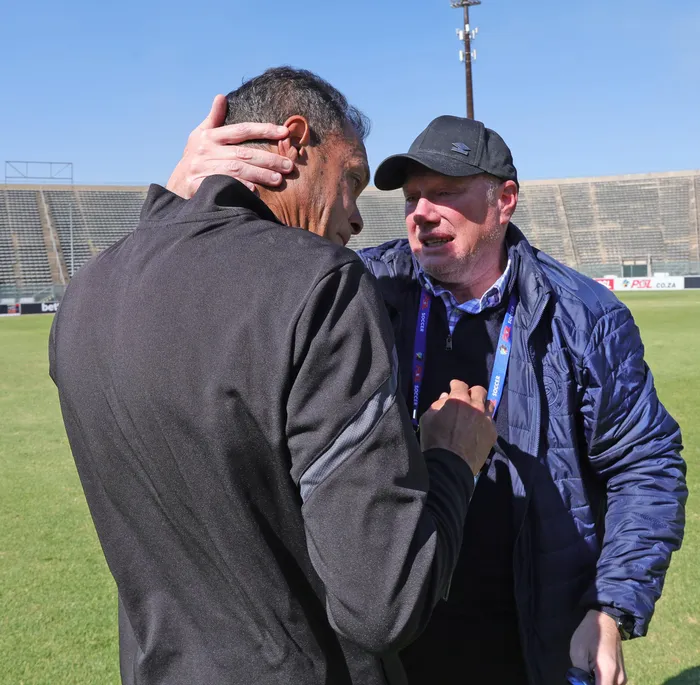COMMENT: Why South African fans should be concerned about the sale of SuperSport United
PSL

Supersport United CEO Stanley Matthews celebrates with coach Andre Arendse after surviving relegation in Pretoria against Golden Arrows.
Image: BACKPAGEPIX
The sale of SuperSport United to Siwelele Football Club, pending PSL Executive Committee approval, has reignited an uncomfortable reality in South African football — one that has quietly unfolded over the past decade.
Clubs are no longer preserved for legacy, community, or youth development. They are bought and sold like stock — and for fans, that’s deeply worrying.
SuperSport’s decision to offload United after 30 years is not an isolated event. It joins a growing list of high-profile sales and disappearances that have reshaped the domestic football landscape.
Bloemfontein Celtic was sold and rebranded. Bidvest Wits was bought out and vanished with 99 years of South African football history overnight. Highlands Park? Gone! Platinum Stars? Disbanded! Free State Stars? History!
And now, even one of the most professionally run clubs in the league, with multiple league titles and a respected academy, has opted to exit the scene.
The problem is no longer about struggling clubs at the bottom — it’s about the very foundations of club ownership in the PSL.
What makes this trend more concerning is the growing number of sales to individuals who have money, but little footballing vision.
The sale of SuperSport United — to a company led by Calvin Lee John, the son of Sports Minister Gayton McKenzie — once again raises questions about the motive behind such deals.
McKenzie has made no secret of his desire to revive Bloemfontein Celtic and restore football in the Free State. But it’s unclear whether this deal is rooted in football ambition or political convenience.
And that’s the danger — South African football is increasingly vulnerable to being captured by people with deep pockets, but no real interest in development, sustainability, or the supporters themselves.
These clubs are more than brands. They represent communities. SuperSport United produced players like Ronwen Williams, Kermit Erasmus and Daine Klate among the long list of top stars.
It had structure, continuity, and a philosophy. Now, that future hangs in the balance. Will the academy survive under new ownership? Will the club stay in Tshwane?
The PSL has thrived commercially — thanks largely to the broadcast deal with SuperSport — but the league has failed to regulate club ownership in a way that protects supporters, youth systems, and long-term identity. In many cases, clubs are sold to the highest bidder, not the right one.
The result? Owners with no plan beyond buying a status. No vision for the next generation. No obligation to invest in the local game. No desire to build something lasting. And the fans are the ones who suffer.
If South African football is serious about building a future, then it needs to put guardrails in place. Licensing, financial sustainability checks, and commitments to development must be part of any sale.
Until then, we will continue watching clubs disappear or transform beyond recognition — while supporters are left out of the conversation entirely.
The sale of SuperSport United isn’t just business. It’s a warning shot. And if nothing changes, it won’t be the last.
Related Topics: